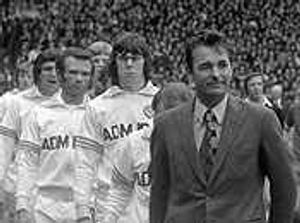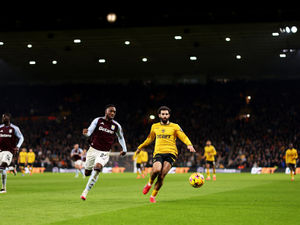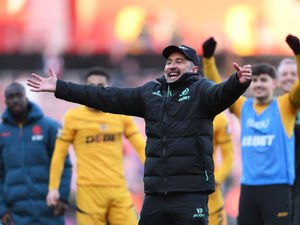Is it the real story of Cloughie?
Four years after his death and more than a decade on from his retirement, Brian Clough is back in centre-stage.

The Damned United, which hits cinemas next Friday, is tipped to captivate a new generation with the wit and genius of a football great.
Yet one West Midlands journalist who knew 'Old Big 'Ead' better than most is warning cinema-goers that all is not as it appears, in the big-screen tale of Clough's infamous 44 days in charge of Leeds.
BBC Radio Five Live's Pat Murphy was Clough's friend, biographer and ghost writer until his death in 2004, having interviewed him during his time at both Derby and Nottingham Forest.
Murphy was angered by the 2006 book, The Damned United, by David Peace. He is only marginally more enamoured with the film that Peace's work has spawned.
He is adamant that neither the book, which Peace maintains is a novel and not a biography, or the film starring Michael Sheen give an accurate portrayal of Clough or his ill-fated tenure at Elland Road.
He said: "I thought the book was disreputable, masquerading as a novel when it couldn't possibly be a novel because it was laced with fact. You can't have it both ways.
"I question whether this film would have happened had it not been for the success of the novel and the fact that Brian Clough died in 2004 - you can't libel the dead.
"Among those featured who are dead are Manny Cussins, Don Revie, Billy Bremner, Peter Taylor and Brian Clough and they are all central protagonists. The only central protagonist still alive is John Giles. He was furious about the book and refuses to see the film.
"He says all the things involving him in the book are fanciful and untrue, and if that applies to him what does it mean to everybody else?"
Murphy first chronicled Clough's life in 1993, then again with an updated biography following his death, so Murphy is well-versed in the events of Clough's seven weeks as successor to arch-rival Don Revie at Leeds.
Having also seen the great man in action first-hand as he made his name on a national stage at Derby, Murphy is less than impressed with the author's attention to detail – not least the focus on Clough's drinking habits.
The writer said: "Peace would say it's a novel. I would say it's novella, laced with facts to make dubious conclusions and a lot of the quotes are imagined, specious fantasy and John Giles would agree."
Leeds legend and former Albion boss Giles sued publishers of the Damned United successfully and Peace was forced to re-write sections of the book.
Murphy said: "The film treats Clough in a lighter manner in terms of his darkness and alcoholism, but all that stuff but the movie is based on a false premise.
"They take Brian Clough from 10, 12 or 15 years in the future, when he was struggling with alcoholism, and graft him into 1974.
"In 1974 he was at the peak of his power and Martin O'Neill confirmed what I knew, which was when he turned up at Forest in January 1975 he was at the peak of his physical prowess and he was a fine physical specimen.
"He still took part in five-a-sides, played squash until his early 1980s. He wasn't a drinker and he wasn't a smoker as the film portrayed. He liked a drink and he occasionally got drunk but he didn't have a drink problem.
"He was at the top of his powers and how could he not be? Everyone knows what he did from 1975 onwards. They have taken the older Clough and grafted it on to Derby and Leeds, because it makes better drama.
"People will say I am being anally retentive but I have seen the film twice and counted 17 factual inaccuracies.
"We've got a photocall at Derby involving Dave Mackay, John McGovern and John O'Hare as though they were new signings. John O'Hare was signed a year before, while McGovern and Mackay signed on different days.
"You've got Mackay being in the Derby team in 1973-74 when they played Leeds in a League match just before the European Cup semi-final but Mackay had been gone from Derby for nearly two years.
"You've got him being part of the player's revolt in October '73 and Mackay was manager of Nottingham Forest at the time.
"On behalf of Brian Clough's managerial reputation, it is absolute nonsense to say he would have been sat in the manager's office not able to face watching his Derby County team beat Leeds at the Baseball Ground.
"The very idea of Brian Clough not wanting to go head to head with another manager – especially one like Revie whose ideals he detested – is nonsense."
Despite his reservations, Murphy still expects the film to be a hit, especially among those too young to have witnessed the real Clough in his pomp.
He said: "In entertainment terms I understand it will go well, because Brian Clough has been retired for 16 years and he was actually fairly reclusive from about 1975 onwards.
"When he went to Nottingham Forest he rationed his media appearances and public pronouncements, so we have not been awash with Brian Clough and his thoughts since 1975.
"There are several generations who would not have experienced how fantastic he was in the media.
"He was the best TV panellist and that 1970-74 period was mad for Brian Clough both in terms of achievement, sailing close to the wind, getting above himself and being all over the country.
"People of the younger generation would probably look at the film and say 'wow, he was fantastic', whereas people of my generation know he was fantastic.
"I think I will be in the minority, because I don't think people will care about the dramatic licence but I think people of my generation, particularly journalists, will say it doesn't ring true."
Murphy was joined at his advance viewing of the film by Martin O'Neill, who played under Clough and assistant Peter Taylor for six years at Nottingham Forest.
While he is less bothered than Murphy about the dramatic licence on view, the Villa boss, who began working with Clough just months after he left Leeds, confirmed the portrayal of his drinking in the film is inaccurate.
He said: "I didn't see that or detect any of it. I would be absolutely convinced in January of 1975 that Brian Clough, who was recovering from injury to his pride after the sacking at Leeds United, arrived at Nottingham Forest with a massive point to prove and he was as sharp as a tack.
"He was physically in excellent condition, I didn't see anything and I don't think any of the Forest players at the time noticed anything like that.
"For the next six years, I thought he was totally tuned in mentally and he was a very refined physical specimen in really good shape, with no mind-blur from the possibility of drinking.
"John O'Hare might disagree but I still believe that Nottingham Forest saw the very best of him, because he arrived there with a point to prove from the Leeds United debacle.
"He wanted to prove he was one of the very best managers of all time and, from my time there, he definitely proved it.
"I think you can over-blow things to an extent and if you want to find inaccuracies you can find them. It's just that having known the characters involved and the chronology to it I wish they had stuck a little bit more closely to the 'script'.
"Does it affect someone's enjoyment of it? I suppose as a piece of 'faction' it's probably enjoyable and that's what the director would want.
"But because I was aware of the characters from a professional viewpoint, I would have been concerned at the portrayal of some aspects of the character.
"But there are one or two pieces in the film where I feel Michael Sheen has got Brian Clough off to a tee.
"There are one or two moments where I saw a little glimpse, a shifting of the eyes, a mouth movement or a voice where I think if I was listening I would think that was Brian Clough."





